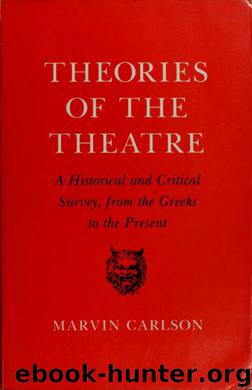Theories of the theatre : a historical and critical survey from the Greeks to the present by Carlson Marvin A. 1935-

Author:Carlson, Marvin A., 1935-
Language: eng
Format: epub
Tags: Theater, Dramatic criticism
Publisher: Ithaca : Cornell University Press
Published: 1984-03-14T16:00:00+00:00
Eighteenth-Century France
turbed by the growing influence of Voltaire and of worldly Parisian ideas in this (in Rousseau's opinion) still unspoiled community, was spurred to reply to this proposal. His first major published work, the Lettre a M. d'Alembert (1758), cast Rousseau in the role of a modern-day Plato defending a Calvinist republic from corruption. Indeed, in an appended essay, De ['imitation thedtrale, Rousseau appeals to Plato directly, expanding upon comments drawn from the second book of the Laws and the tenth of the Republic.
The Lettre is itself a lengthy essay, exploring so wide a range of Rousseau's concerns that it has been called his own encyclopedia. Nevertheless, the theatre serves as a unifying theme, especially in respect to its effect upon audiences. One cannot speak of public amusements as good or bad in themselves, says Rousseau, since man is so modified by religion, government, laws, customs, predispositions, and climate that one cannot ask what is good for men in general but only "what is good in any particular time and country."^^ For his Geneva, at least, Rousseau sees no profit in theatre, and much potential harm. He denies instruction as its major aim; rather, its exists primarily to amuse and must thus conform to and flatter public opinion. It "reinforces the national character, augments natural inclinations, and gives new energy to all the passions." At best then, theatre might encourage those already virtuous, but it would similarly encourage those inclined to vice. The doctrine of catharsis Rousseau denies entirely, insisting that the arousal of emotions can in no way remove emotions. "The only instrument which can purge them is reason, and I have already said that reason has no effect in the theatre."^^ Indeed, if we wish to learn to love virtue and to hate vice, the best teachers are reason and nature. Theatre is not needed to teach this, even were it effective in doing so.
It may be that theatre, by appealing to man's natural benevolence, calls up a shadow of goodness, but it remains a shadow, since the conventions of drama inevitably remove the experience there from application to everyday life. Even Moliere, whom Rousseau praises as the best of comic writers, seeks primarily "to ridicule goodness and simplicity and to engage our interest on behalf of characters who employ ruses and lies."^^ (A major example of a virtuous character so ridiculed is Alceste in Le misanthrope, with whom Rousseau clearly feels deep sympathy.) And both tragedy and comedy have become steadily more decadent since Moliere, chiefly by the development of love interests, which Rousseau, echoing Pascal,^^ considers to have the most bale-
^°Jean-Jacques Rousseau, Oeuvres, 25 vols. (Paris, 1823-26), 2:21.
^'Ibid., 24-26.
'''Ibid., 45.
^'Blaise Pascal, ch. 24,40, Pensees, edition variorum (Paris, n.d.), 383.
Download
This site does not store any files on its server. We only index and link to content provided by other sites. Please contact the content providers to delete copyright contents if any and email us, we'll remove relevant links or contents immediately.
4 3 2 1: A Novel by Paul Auster(12393)
The handmaid's tale by Margaret Atwood(7767)
Giovanni's Room by James Baldwin(7346)
Asking the Right Questions: A Guide to Critical Thinking by M. Neil Browne & Stuart M. Keeley(5775)
Big Magic: Creative Living Beyond Fear by Elizabeth Gilbert(5774)
Ego Is the Enemy by Ryan Holiday(5450)
The Body: A Guide for Occupants by Bill Bryson(5098)
On Writing A Memoir of the Craft by Stephen King(4944)
Ken Follett - World without end by Ken Follett(4734)
Adulting by Kelly Williams Brown(4574)
Bluets by Maggie Nelson(4559)
Eat That Frog! by Brian Tracy(4541)
Guilty Pleasures by Laurell K Hamilton(4450)
The Poetry of Pablo Neruda by Pablo Neruda(4110)
Alive: The Story of the Andes Survivors by Piers Paul Read(4033)
White Noise - A Novel by Don DeLillo(4012)
Fingerprints of the Gods by Graham Hancock(4004)
The Book of Joy by Dalai Lama(3986)
The Bookshop by Penelope Fitzgerald(3854)
